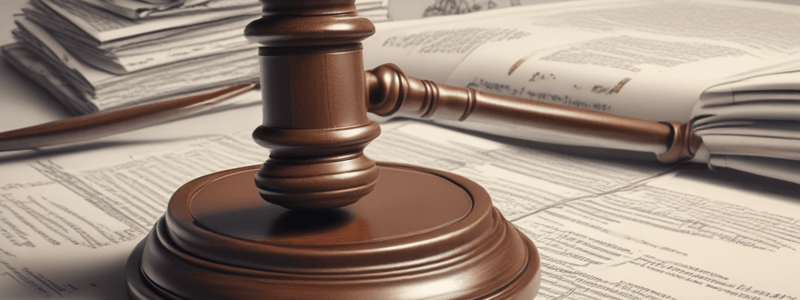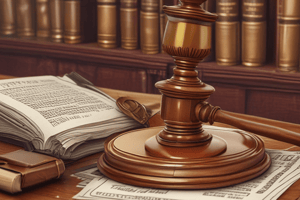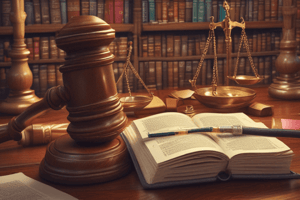Podcast
Questions and Answers
What is the difference between Acts of Parliament and provincial acts?
What is the difference between Acts of Parliament and provincial acts?
Acts of Parliament are passed by the national Parliament, while provincial acts are passed by provincial legislatures.
What is the definition of subordinate or delegated legislation?
What is the definition of subordinate or delegated legislation?
Subordinate or delegated legislation is law enacted by a person or body under the authority of a power granted by primary legislation, also known as the 'enabling' legislation.
What is the key principle regarding the relationship between subordinate legislation and its enabling legislation?
What is the key principle regarding the relationship between subordinate legislation and its enabling legislation?
Subordinate legislation cannot be in conflict with its enabling original legislation.
What happens if the enabling Act is declared unconstitutional?
What happens if the enabling Act is declared unconstitutional?
What happens if the enabling Act is repealed?
What happens if the enabling Act is repealed?
Who has the power to repeal or amend its own legislation?
Who has the power to repeal or amend its own legislation?
What is the key principle regarding Parliament's ability to delegate its power to amend or repeal an Act of Parliament?
What is the key principle regarding Parliament's ability to delegate its power to amend or repeal an Act of Parliament?
What is the relationship between Parliament and subordinate legislation?
What is the relationship between Parliament and subordinate legislation?
What is the difference between primary and subordinate legislation in the company analogy provided?
What is the difference between primary and subordinate legislation in the company analogy provided?
Why are certain legal documents, like common law, case law, and policy documents, not considered legislation?
Why are certain legal documents, like common law, case law, and policy documents, not considered legislation?
What is the definition of 'law of general application'?
What is the definition of 'law of general application'?
What is the key difference between primary and subordinate legislation in terms of the ability to amend or repeal?
What is the key difference between primary and subordinate legislation in terms of the ability to amend or repeal?
What is the difference between a process and a procedure?
What is the difference between a process and a procedure?
Explain the concept of 'ultra vires' and how it relates to the principle of 'trias politica'.
Explain the concept of 'ultra vires' and how it relates to the principle of 'trias politica'.
Differentiate between the ratio decidendi and obiter dictum in the context of case law.
Differentiate between the ratio decidendi and obiter dictum in the context of case law.
Explain the significance of the principle of 'stare decisis' in the common law system.
Explain the significance of the principle of 'stare decisis' in the common law system.
Discuss the distinction between 'legalese' and 'accessibility' in the context of legal language and access to justice.
Discuss the distinction between 'legalese' and 'accessibility' in the context of legal language and access to justice.
Distinguish between 'foreign law' and 'international law' in the context of legal sources.
Distinguish between 'foreign law' and 'international law' in the context of legal sources.
What is the significance of Section 2 of the Interpretation Act and Section 239 of the Constitution in relation to legislation?
What is the significance of Section 2 of the Interpretation Act and Section 239 of the Constitution in relation to legislation?
Explain the chronological classification of legislation in South Africa and the implications for each category.
Explain the chronological classification of legislation in South Africa and the implications for each category.
How does the Constitution address the geographical application of old-order legislation in South Africa?
How does the Constitution address the geographical application of old-order legislation in South Africa?
Describe the hierarchical structure of legislation in South Africa, with specific reference to the Constitution and primary legislation.
Describe the hierarchical structure of legislation in South Africa, with specific reference to the Constitution and primary legislation.
What is the significance of the phrase 'lex fundamentalis' in relation to the Constitution of South Africa?
What is the significance of the phrase 'lex fundamentalis' in relation to the Constitution of South Africa?
Explain the process by which old-order legislation can be repealed, amended, or declared unconstitutional, and the implications of each action.
Explain the process by which old-order legislation can be repealed, amended, or declared unconstitutional, and the implications of each action.
Flashcards are hidden until you start studying



